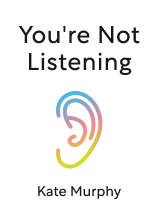

This article is an excerpt from the Shortform book guide to "You're Not Listening" by Kate Murphy. Shortform has the world's best summaries and analyses of books you should be reading.
Like this article? Sign up for a free trial here.
What don’t you know? How sounds are your beliefs? What if your inner voice gained more wisdom?
It’s probably no surprise that you learn and grow when you listen well. But, you might not be aware of the specific ways you improve. This holds true, not just for the listener, but for the speaker, as well. When you’re not listening, you’re missing out.
Read on to understand and appreciate the ways you learn by listening.
Listening Helps the Listener Learn and Grow
Listening to others helps you learn more about people and the world around you—leading to a more interesting life with more personal growth. Kate Murphy states that, when you talk, you talking only about things you already know. However, when you listen to others, you also get to hear about things you don’t already know. She outlines three ways you learn by listening.
1) By considering ideas that wouldn’t have occurred to you, you develop new perspectives and come to new understandings that you wouldn’t have reached on your own.
(Shortform note: We can clarify the benefits of taking in many perspectives by understanding the differences between divergent and convergent thinking. Divergent thinking includes generating new ideas, making unexpected connections, and exploring new perspectives. Convergent thinking involves synthesizing, judging, and analyzing the ideas generated through divergent thinking. These two modes of thought work together to develop insights and understanding. Thus, we can see effective listening as a form of divergent thinking—it allows us to stay open to new ideas without judging or analyzing them during the conversation.)
2) Discovering new points of view allows you to challenge your own beliefs. This has the power to help you discover errors in your thinking and make you more secure in your convictions. Murphy explains that we’re most afraid of our ideas being challenged when they’re untested. By testing your own beliefs, you can become less afraid of these challenges. This will actually make you more secure in your beliefs because you know they can stand up to challenge.
(Shortform note: In Antifragile, Nassim Nicholas Taleb argues that people rise to the occasion when they’re challenged—and become complacent when they’re not. Therefore, encountering beliefs that challenge your own could force you to think more deeply than you would have otherwise. By rising to the challenge and thinking through issues, you’re not just testing ideas and becoming more secure, you’re also rigorously cultivating your intellect in ways that you couldn’t by surrounding yourself with familiar and unchallenging viewpoints.)
3) Listening to others can enrich your inner voice. People’s inner voices typically pull from the voices they’ve listened to throughout their lives—such as parents, teachers, or close friends. By listening effectively to people, you can bring a greater variety of perspectives and wisdom to this inner voice.
(Shortform note: Psychologists have identified a wide range of benefits to developing your inner voice. They find that it helps children develop, improves working memory, enables silent reading, and increases motivation. However, when not properly managed, your internal monologue may also distract you. Therefore, many psychologists recommend deliberately cultivating a practice of healthy and encouraging self-talk.)
Listening Helps the Speaker Learn and Grow
Murphy also states that being effectively listened to can help the speaker learn and grow by providing an opportunity to process and solve their own problems. Listening builds trust between both parties. When the speaker feels they can trust their listener, it allows them to open up and explore their thoughts and feelings in greater depth.
By talking about their feelings in greater depth, the speaker has the opportunity to process problems, see new solutions, or come to a deeper understanding of themselves. All of these can aid the speaker in their personal growth by helping them to better understand their needs and challenges in life.
(Shortform note: Beyond coming to a deeper understanding of problems, researchers have found that talking about emotionally painful experiences also helps people heal from them. By naming and identifying their emotions, people have the power to alleviate distress and experience feelings of peace. This happens because talking about emotions can shift the brain’s emotional activity from reactive parts of the brain, like the amygdala, to thinking parts of the brain, like the prefrontal cortex. This allows emotions to become less overwhelming.)

———End of Preview———
Like what you just read? Read the rest of the world's best book summary and analysis of Kate Murphy's "You're Not Listening" at Shortform.
Here's what you'll find in our full You're Not Listening summary:
- A look at how listening skills are disappearing throughout society
- How to become a better, more effective listener
- Why it's easier to listen to strangers than to those close to you






